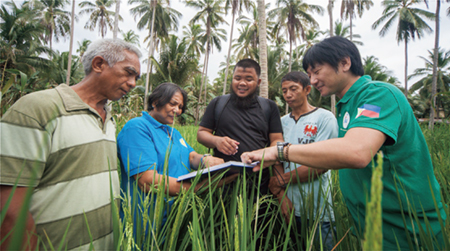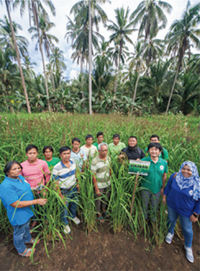Stories from the Field 04
Supporting Reconstruction and Peace through Socio-economic Development
– Working to Sustain Peace in Mindanao, the Philippines
The Philippines is the only Christian country in ASEAN; more than 90% of its about 100.98 million people identify themselves as Christian, while 5% identify as Muslim. Most of the country's Muslim population lives in southwest area of Mindanao Island in the southern part of the Philippines. The Muslims living here are called Moro, and the land where they live is called Bangsamoro (which means Moro land). Bangsamoro Muslims organized an antigovernment group hoping to gain independence in response to Christianization under Spanish colonial rule. This group has repeatedly engaged in armed conflict since the 1970s. After many years of conflict, the Government of the Philippines and the Moro Islamic Liberation Front (MILF) signed a comprehensive peace agreement to establish a new autonomous government for Muslims in March 2014.
Japan was dedicated in facilitating the peace process between the Government of the Philippines and MILF since before the peace agreement was reached. As part of this ongoing cooperation, JICA staff have been continually dispatched to the International Monitoring Team (IMT*1) in Mindanao since 2006. In July 2013, Japan launched the Comprehensive Capacity Development Project for the Bangsamoro (CCDP*2) to support the reconstruction and development of the Bangsamoro region, which faces many challenges as a result of the prolonged conflict, including a high poverty rate and shortage of government services and infrastructure. This project continues to provide assistance covering the three pillars of “enhanced governance,” “government service expansion and community development,” and “regional economic promotion” in order to contribute to peace and development in Mindanao.

MILF soldiers learning about farming techniques (pictured at right is Mr. Demizu) (Photo: JICA Philippines Office)
Mr. Koji Demizu, who is in charge of government service expansion and community development, says that agricultural income is one of the few sources of income for MILF soldiers considered to be “half farmer and half soldier” who farm for a living, and increasing the yield of crops with high commercial value is key to improving their livelihoods and reducing poverty. However, many of the communities under MILF's control are located in remote mountainous areas far from main roads, which makes them almost the same as an inaccessible land. In addition to the fact that the Government of the Philippines has not provided public services there, there are no irrigation facilities, which makes it difficult to pursue high yielding wet-land rice cultivation, and even if they attempted to cultivate dry-land rice, which has higher selling price than corn or other crops, they did not have the information or the skills needed to grow rice in fields. Therefore, since April 2016, this project has been providing training to improve dry-land rice cultivation at the Philippine Rice Research Institute (PhilRice), a government corporate entity, as part of its assistance for dry-land rice farming. During each session, around 30 MILF soldiers receive lectures at the PhilRice and practical instruction at a field of around 1,000 square meters. To date, 362 MILF soldiers have learned new growing techniques through this training. “Until now, this community barely had the skills to grow a vegetable garden, but with the assistance of Japan they were given opportunities to learn agricultural techniques and knowledge, and by putting this learning to use, they have significantly increased their dry-land rice harvest. Having heard this, I feel the project is really making a difference,” says Mr. Demizu.

Dry-land rice field cultivated by MILF soldiers prior to harvest (Photo: JICA Philippines Office)
Prior to Japan's assistance, no other international agency had been active in the MILF community. One reason is that MILF was very suspicious during the conflict and tended to refuse outside help even from fellow Muslims. “Simply starting this project in this community was a giant step,” says Mr. Demizu. The foundation for the project's activities is the trusting relationship among Japan, the Government of the Philippines and MILF. One of the people who built up this relationship is Mr. Naoyuki Ochiai, the head of CCDP, who has been involved in assistance projects in the Philippines for 17 years in total. Mr. Ochiai, who was also a member of IMT, has long been involved in grassroots activities locally, including negotiations with MILF leaders and listening to the voices of local people. “Earning someone's trust means you have to be 'close by'. It is important for experts like us to head into the field and be close to the people to understand the issues they face and what they need,” says Mr. Ochiai. He continues, “The goal of peace of creating a new government in Bangsamoro is close at hand. I feel this has changed the once hostile outlook of MILF for the better. Expectations for peace have also energized local economic activities. As a result, I feel like we are slowly moving towards true peace.”
Mr. Demizu and Mr. Ochiai will continue to support the government and people while watching over the birth of the new Bangsamoro autonomous government “close by.” Initiatives for the reconstruction and peace of the Bangsamoro region through development will continue in the future.
*1 A multinational team established in 2003 following the ceasefire agreement between the Government of the Philippines and MILF. Japan is responsible for investigating development needs aimed at socio-economic growth as well as the identification, formation, implementation and monitoring of specific projects.
*2 The term of the project is the six-year period from July 2013 to July 2019.
<< Previous Page Next Page >>
Main Text | Statistics and Reference Materials | Stories from the Field | Master Techniques from Japan to the World | ODA Topics
